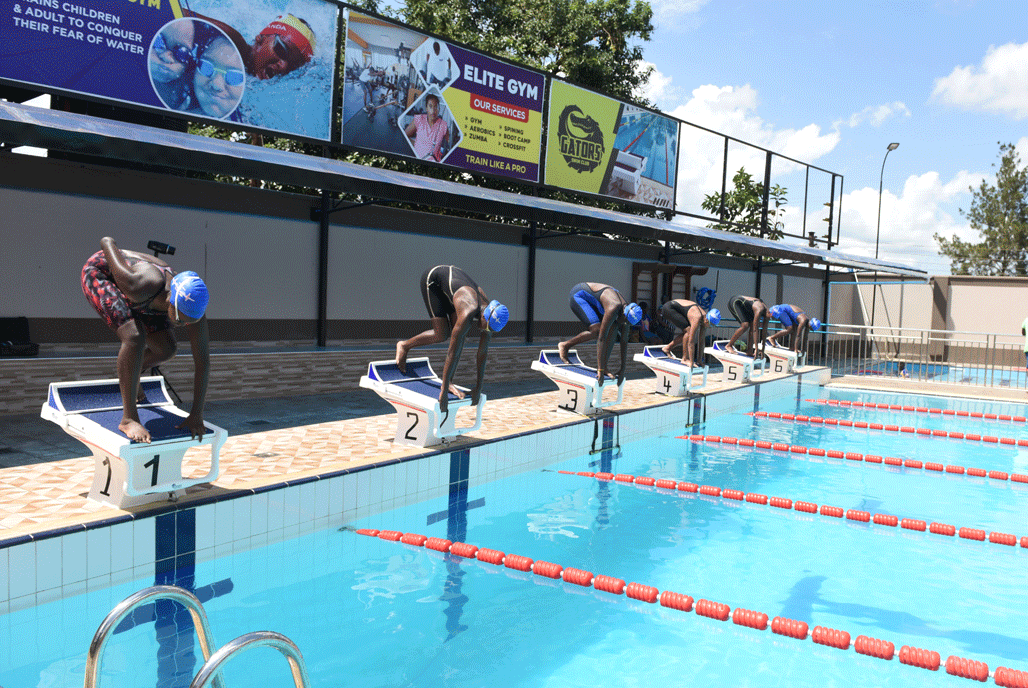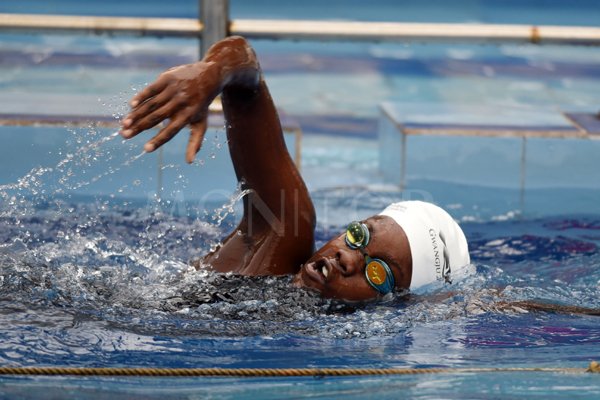Prime
Gators hope to reap big from new home

Infrastructural development. Gators Swim Club have a new home Elite Swim & Gym in Ntinda with the equipment, which they feel will match their ambitions to produce the best swimmers in the country. PHOTO/ISMAIL KEZAALA
What you need to know:
- At the end of the day, this is a business too and there must be ways of keeping the lights on, and maintaining the equipment.
If you love to take a look around, then it is likely you will notice the Elite Swim & Gym when you move along the Ntinda-Bukoto stretch.
The signage, completed with pictures of some of the country’s popular swimmers, is unmistakable and also lights up spectacularly in the night’s darkness.
This beauty is what new swim club, Gators, hope to bring to the national scene after they broke away from Dolphins last month.
Gators’ story is incomplete without tales of the facility, which was mooted after the first lockdown induced by the Covid-19 pandemic in March 2020 and will be their home.
When the sports sector was reopened in September 2020, swimming in pools stayed inactive till around March 2021.
Still clubs struggled to find swimming pools as some hotels and schools took the precaution to keep their pools closed. Most swimmers kept to the dryland activities they had been doing during lockdown.
Eventually, what were then Dolphins swimmers under tutelage of coach Muzafaru Muwanguzi started to swim at a pool in Rubaga and later Hotel Africana, which they left after the breakaway and completion of works in Ntinda.
The construction
“We were literally fishing frogs out of that Rubaga pool every morning before the swimmers could dive in,” Mrs Hitesh Usadadiya, proprietor of Elite Swim & Gym, says, her face evidently cringing.
“It’s at this point that my husband and I decided we were building our son a pool. We thought maybe three lanes would do and started to hunt for land,” Mrs Usadadiya, mother of national swimmer Heer Usadadiya, says.
Heer, 13, has done well to turn himself into a national swimmer despite starting a bit later than his peers at eight. He now holds the 12 and under boys’ 100m backstroke national record at 1:11.92 – one he made at the Cana Zone III Championships in Kampala last December.
At the back of their minds, the Usadadiyas wanted something that could help Heer and his friends so even the location started to matter. Eventually an agent led them to Ntinda, where KK Health Club was located but whose proprietor wanted out.
The deal was done swiftly.
“We broke down two buildings, demolished the pool. We took out over 200 trucks of debris,” Mr Usadadiya, who had now joined the conversation, shares.
“We wanted something fresh. And for an entire year, we were here everyday and night to oversee the project.
“We were taking turns to sleep for less than four hours a day to put up this structure. Now the facility is here and we are bored not knowing what to do with our time,” the businessman, who had to do some of the steel work personally, adds.
What you have now is evidently the best short course pool in the country designed by Heer from one of his video games.
It is 25m long and six lanes wide. They could have been more but Kampala City Council Authority rules demand that two metres are left free between the wall and any structure.
“We wanted to respect every detail. But also, we were under no pressure to construct eight lanes. We were not looking at hosting competitions but putting up a very good training facility for our swimmers.
“The space around the pool is also too small to accommodate over 500 swimmers so you cannot say, we would host competitions anyway,” Mrs Usadadiya shares.
Conducive environment
The attention to detail was peculiar. Although ‘luxury’ swimmers to the place would prefer to have rails around the pool that they can hold onto, putting them was never an option as the proprietors wanted to aid turns for their competitive swimmers.
“The diving blocks are adjustable. If you’re short and want it low, you can change,” says Freda Luzinda, a swimmer at Gators.
Diving blocks are platforms at the end of lane – usually in the deep end – which swimmers mount to launch their bodies into the pool from a crouched position.
Starting-block construction must meet stringent guidelines for swimmer safety and comfort. These ones have a footrests and handles while there are also backstroke wedges to complete the set.
“First, the pool is well measured,” Muwanguzi, the lead coach at Gators, says as he explains why starting blocks, which you will hardly find at most training pools in the country, are key.
“Swimmers who don’t practice on starting blocks have poor racing skills. So we are definitely scoring in that aspect. In general, this is a good training environment because there is also a gym. A lot can be completed here.”
From the blocks, the gyms are to the left of the pool, in between a smaller pool and the only building that survived from the KK demolition. This one houses the pool minders and dressing rooms for the swimmers.
Opposite the dressing room building is a sizeable parking lot and on its right is a sitting area and a restaurant.
Full package
Muwanguzi has been religiously promoting out-of-the-pool training for swimmers for at least six years now. But with gyms around Kampala offering various packages at different prices, his swimmers have not been doing this dryland work in a group.
And while it has not been straightforward for him to supervise this work, it has also been hectic for parents as it eats into their weekends and swimmers’ resting time.
“On Saturday mornings, for example, we would swim and then run to the gym. By the time you are done with those activities, you find yourself returning home at 1pm. Now, we do everything in one place and by 9am, Heer is back home to rest or do other activities,” Mrs Usadadiya shares.
The gym, equipped with medicine balls, bands, dumbbells, stretchcordz, bikes, treadmills and ergometers, has space on its second floor for other exercises like aerobics.
“These were mostly imported and we are requesting that government stops taxing the activities of Elite Swim & Gym.
“This is our way of giving back to society and even the Fina president (Husain Al Musallam) clearly stated that he would donate to Uganda almost a similar pool but it should not be taxed because these facilities are for everyone,” Mrs Usadadiya said.
At the end of the day, this is a business too and there must be ways of keeping the lights on, and maintaining the equipment.
The Usadadiyas were coy about how much they spent in putting up the facility, but they say they “got huge support from their bank” and the weight of the project was a bit clear when they said; “we do not care if we take over 10 years to break even because our vision is to aid the process of creating the best swimmers in this country.”
A home for all
When Tendo Mukalazi and his sister Kirabo Namutebi returned from their yearlong scholarship in Russia, everyone worried about where they would find the facilities in this country to continue their high performance programme.
They look more at home inside the walls of the gym. And their insistence to dive off the blocks and swim in the water before its first treatment was even completed in April, showed how much they loved their new home.
While Gators are the main clients, Elite Swim & Gym is open to everyone and the owners are also banking on cultivating relationships with nationals sports teams and clubs to keep the place popular and functioning.




